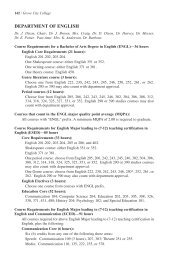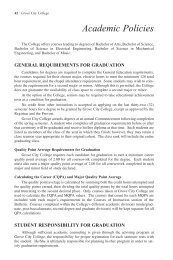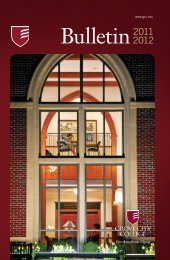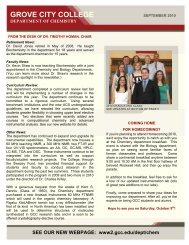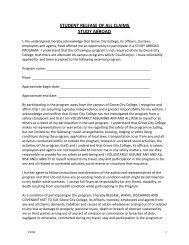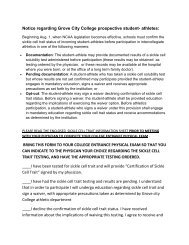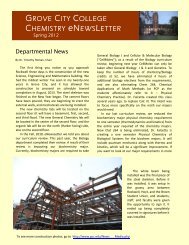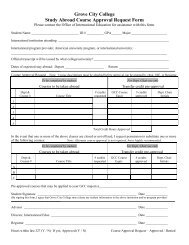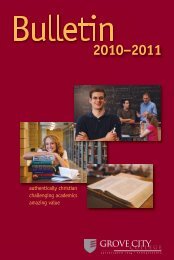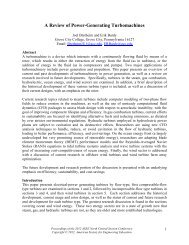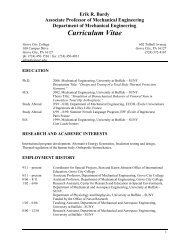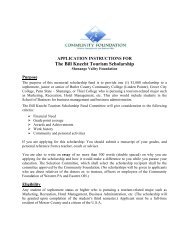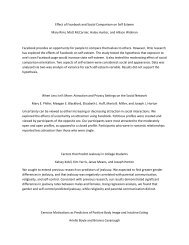2009–2010 - Grove City College
2009–2010 - Grove City College
2009–2010 - Grove City College
Create successful ePaper yourself
Turn your PDF publications into a flip-book with our unique Google optimized e-Paper software.
History / 141<br />
European History: History 208, 209, 212, 261, 262, 271, or 272.<br />
Other History Electives: History 143, 144, 207, 223, 231, 260, 270, 317, 318, 336,<br />
341, 346, 349, 350, 357, 360, 370, 375, 376, 379, 390, 400, 460, 470, 480, or 488.<br />
Course Requirements for a minor in Interdisciplinary Classics<br />
Consult the Philosophy section in the Department of Religion for the 21-hour requirements.<br />
HISTORY (HIST)<br />
HIST 120. FOUNDATIONS OF HISTORY. An introduction to the principal theories, ideas, concepts,<br />
methods, and debates that have shaped the discipline of history. The course examines competing<br />
perspectives of history, human nature, and providence. It analyzes how historians use and evaluate<br />
evidence and provides Christian perspectives on history. Semester course, three hours.<br />
HIST 141. WORLD GEOGRAPHY. An exploration of the physical and human geography of the<br />
globe. Semester course, three hours.<br />
HIST 143. WORLD HISTORY I. A survey of the basic history of world societies from the earliest<br />
recorded development of human civilizations to the early modern period. As an Information Literacy<br />
(IL) course, it emphasizes designing historical research questions; finding, evaluating, and using primary<br />
and secondary sources; citing sources properly; and writing a cogent paper.<br />
Fall semester only, three hours.<br />
HIST 144. WORLD HISTORY II. A survey of the history of world societies from the early modern<br />
period to the present. Special emphasis is given to the interrelationship between the Western world<br />
and the non-Western world. Spring semester only, three hours.<br />
HIST 201. HISTORIOGRAPHY. An introduction to the art and craft of history. Through readings<br />
and discussions, students learn the basics of the discipline of history, focusing on what historians do<br />
and have done, the essential concepts and methodologies they use, and the vocabularies they employ.<br />
Students sharpen the skills essential for work as a historian: critical reading, effective analysis, and<br />
excellent writing. This course fulfills the Writing Intensive (WI), Speaking Intensive (SI), and<br />
Information Literacy (IL) requirements for History and SESS majors.<br />
Semester course, three hours.<br />
HIST 207. THE ANCIENT WORLD. A survey of ancient Near Eastern, Mediterranean, and<br />
European cultures with emphasis on the formation of empires. The course explores the varied cultural<br />
legacies of ancient civilizations. Offered alternate Falls, semester course, three hours.<br />
HIST 208. MEDIEVAL EUROPE. A survey of Europe from the end of the Roman Empire to the<br />
early fifteenth century that emphasizes the cultural and intellectual legacy of the Middle Ages.<br />
Offered alternate Springs, semester course, three hours.<br />
HIST 209. RENAISSANCE AND EARLY MODERN EUROPE. An examination of the<br />
Renaissance, the formation of nation states in the fifteenth century, the Reformation of the sixteenth<br />
century, and the political, social, and intellectual origins of modern Europe before the French<br />
Revolution. Fall semester only, three hours.<br />
HIST 212. MODERN EUROPE. An examination of European states from 1789 to the present,<br />
focusing on periods of reaction and revolution, the growth of industrial society, and the global wars of<br />
the twentieth century. Spring semester only, three hours.<br />
HIST 223. MODERN ASIAN HISTORY. A survey of political, social, economic, and cultural<br />
trends in East Asia from 1800 to the present, focusing primarily upon China, Korea, and Japan. It<br />
examines the major tenets of East Asian civilization, the course explores the interaction of Asian<br />
nations with Western nations in the nineteenth century. The course also examines the political, economic,<br />
and military conflicts of the twentieth century and concludes by analyzing the tremendous economic<br />
development that has shaped the region in recent decades.<br />
Alternate Fall semesters, three hours.



